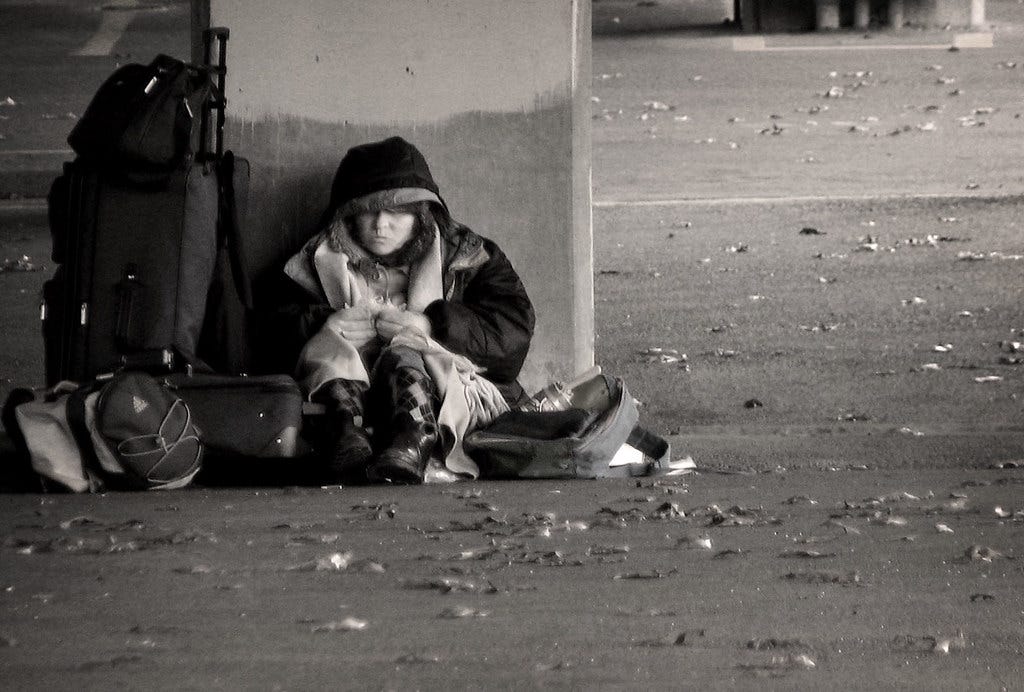Blame NIMBYism for the Unsheltered Crisis
A “Not In My Backyard” ideology is making it harder to support those looking for shelter.
“It’s their own fault that they’re out there on the street. Don’t break the law. Don’t do drugs. It’s that easy. Don’t expect me to feel sorry for you if you’re breaking the law and making bad decisions.”
Sound familiar? We’ve all heard this or even thought like this at some time in our lives. The thinking goes: Families and individuals are unhoused because of their own mistakes. Turns out a plurality of Oregonians think just like that: thirty-two percent of Oregonians believe that individuals without a home are unhoused by their own choosing, and 23% believe that they are unhoused directly because of substance abuse, according to a 2016 survey. We’re putting blame on the wrong people.
In reality, crime and drug addiction are responsible for just a fraction of people on the street. Between 14 and 21 percent of the unsheltered are living on the streets because of substance abuse and between 5 and 18 percent because of a past crime, according to different studies. While Oregonians estimate that the unhoused are at fault the majority of the time, the data says otherwise.
In an overwhelming majority of cases, Americans lose housing because of job loss, lack of affordable housing, domestic violence, and mental health. Once these people are displaced, they become more likely to develop an addiction or criminal record because they're exposed to and victims of these kinds of things on the street. Look at it this way: in many cases, these individuals don’t become unsheltered because they have an addiction, they become addicted because they are unsheltered.
My goal in writing this piece isn’t to make Oregonians feel bad for the unhoused. My goal is to end this “deserving vs. undeserving” debate. Unfortunately, common words like “hobo” and “homeless” have increasingly negative connotations that increase apathy towards the issue. It’s easier to garner support for the unsheltered by using words like “unhoused” or “displaced.” When communities are unhoused, they are in need. Regardless of whether it’s their fault or not, shelters, transitional housing, and affordable housing will get them to a point where they can support themselves and won’t need to rely on others anymore.
Am I being too sympathetic? On the contrary, more sympathy is what Oregon and this country need. When the Salem City Council decided to move forward with creating microshelters in West Salem, there was an enormous gathering of residents at Salemtowne to protest the decision. Salemtowne is a retirement golf community surrounded by a 12 foot brick wall. While many neighbors support creating affordable housing opportunities, they expect it to happen somewhere else. NIMBYism is one of the biggest barriers to addressing the unsheltered crisis. Most people want to help, just “not in my backyard.”
I know this because of the time I recently spent working with the City of Salem’s houselessness response. For the last three months, I interned with Salem City Councilor President Chris Hoy and learned firsthand about the biggest barriers addressing houselessness. I learned that elected leaders are constrained by their constituents that are sympathetic to the unhoused, but don’t want to be inconvenienced by the solution. Elected leaders don’t want to authorize the construction of an apartment complex in your neighborhood, because constituents will be upset.
Laws and neighbors make building new housing complexes difficult and expensive. Elected leaders need to fund programs and nonprofits that are working to house and train the unsheltered with life skills, in an effort to mitigate the crisis. But mitigation is only half the battle. Lawmakers must also create preventative policy that provides social programs, poverty alleviation, and resources for those that are the most likely to become unhoused, like foster children and those recently released from prison.
But before that can happen, these leaders need to see us and our neighbors showing support for affordable housing projects “in our backyard.” We can’t keep expecting to put these resources in other communities, because those other communities would rather set up shelters in different communities too.
If there’s the equivalent of a Salemtowne in your neighborhood standing against affordable housing projects, let them, city councilors, and lawmakers know that your community supports structures like microshelters and shared parking spaces, which end houselessness in our communities. These projects would serve the unsheltered community and those in a Salemtowne setting, by providing a structured and secure way for the houseless to live, instead of being scattered across the city. That’s what Salem is doing, despite the pushback. It’s time for other cities to follow suit.
Jared is a Politics, Policy, Law and Ethics Major at Willamette University, aspiring to bring Oregon together to achieve more representative elections and a sustainable energy program to brag about.
photo credit: "Cold" by Misserion is licensed under CC BY 2.0





